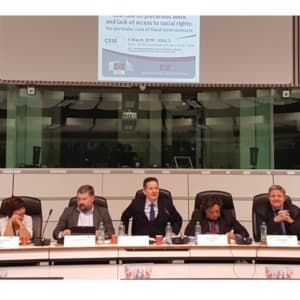2019-03-12 12:00
March 5 saw the launch of a new two-year project of CESI, co-funded by the European Commission, on ‘Precarious work: Empowering trade unions to address the new challenges’. A kick-off conference was held at the European Economic and Social Committee (EESC) in the presence of policy-makers, stakeholders and members of CESI.
The conference addressed two specific aims:
• to understand, at EU level, what precarious work is, and to explore the extent to which it impacts on workers’ access to social rights and social protection in the various Member States.
• to explore possible avenues to improve working conditions and fight precariousness through adapted legislation, a better application of existing law, adjusted social protection systems and a strengthened interest representation by trade unions.
In the opening remarks to the conference, CESI President Romain Wolff from the Luxembourgish CGFP trade union organisation highlighted the persistence of precarious work, also in the public sector, and emphasised how this has become a major concern for trade unions during the last years.
In particular, he sketched how this concern overlaps with evidence-based labour market trends that have been showcasing increasing numbers of workers with fixed-term and part-time contracts during the past 15 years.
In panels moderated by Pierre Baussand, a long standing expert in EU social affairs and Head of the Brussels Office of the EU agency for the improvement of living and working conditions Eurofound, experts from EU institutions, trade unions and the academic field presented their views on precariousness. From the trade union side, Christian Moos from CESI’s German member dbb and CESI Youth Representative Matthäus Fandrejewski confronted the audience in a first panel with a report on challenges and possible solutions related to precarious work in Germany and among young people more generally. EESC President Luca Jahier concluded the first panel, underlining that a motivated workforce with a decent income, quality jobs and social protection coverage is in everyone’s interest, and invited social partners to think ‘outside of the box’ in order to ensure a strong representation of the workforce in precarious forms of work.
It emerged that precarious work is exhibited in particular when:
• there is an involuntary element for workers to taking up non-standard work
• no equal treatment in terms of remuneration, benefits, entitlements working conditions is granted in relation to those in similar positions working under open-ended standard contracts
It also appeared that precarious work becomes all the more more precarious when it happens over long duration of time, and when there is no or only a weak link to interest representation and trade unions.
EESC member Franca Salis Madinier highlighted in a second panel links between increasing levels of poverty and numbers of working poor on the one hand and, on the other, the need for workers in new forms of work to be covered by social dialogue. With the participation of Javier Jordan De Urries from CESI’s Spanish member CSIF, MEP Brando Benifei, Marcello Pacifico from CESI’s Italian affiliate CISAL and CESI Secretary General Klaus Heeger, the afternoon panel aimed to come up with concrete legislative, political, judicial and campaigning proposals to counter precariousness.
CESI Secretary General Klaus Heeger closed the conference, emphasising that CESI should lay its action priorities on four elements: (1) tying social protection coverage increasingly to the individual; (2) enforcing the equal treatment principle between standard and atypical work; (3) guaranteeing strong interest representation for all, ideally through social dialogue, yet subsidiarily through the defense of the individual’s interests such as through consistent judicial claims and legal assistance; and (4) striving to establishing clearer legislative frameworks.
Picture: Franca Salis Madinier, Javier Jordan De Urries, Pierre Baussand, Marcello Pacifico and Klaus Heeger © CESI 2019



